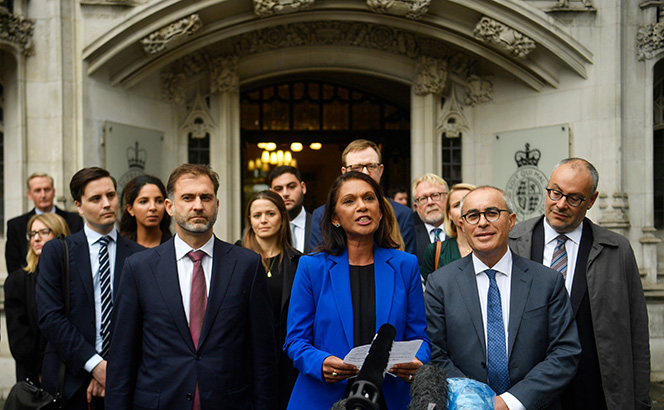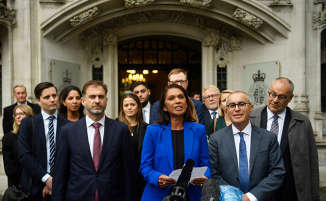For some, Miller 2 is the most significant constitutional case for centuries. For others, just another act in the Shakespearean tragedy or comedy that is Brexit. As an editor of the UK Constitutional Law Blog I have found that lawyers made just as much fuss about the first case brought by Gina Miller in relation to Article 50 as they have over this recent decision. And yet still the constitution carries on; apocalyptic predictions of its demise are surely exaggerated?
It can certainly be argued that it takes more than a high-profile litigator, even one who gets two bites of the cherry (forgive the pun), to overturn our 800-year old constitution. But Miller 2 is, jurisprudentially, very different from Miller 1. It will take time to assimilate the various strands of the decision and we also wait to see whether the courts use it as a launch-pad into further political space. But simply in terms of its reasoning and robust language it already represents a far more assertive judicial attitude to Crown-Parliament relations than we have seen before. Although dressed up as a defence of Parliament, make no mistake, the Court is asserting its own constitutional position under the guise of being Parliament’s trouble-shooter. And if the Supreme Court follows up with further strident interventions in other areas of political decision-making, for example surrounding implementation of the ‘Benn Act’, the consequence could be a self-transformation of our highest appellate court into a constitutional court, comparable to other politically-engaged judicial powerhouses around the world.
Looking back two and a half years, Miller 1 can be explained fairly easily through the traditional relationship between the Crown, Parliament and the courts. Parliament passed the European Communities Act 1972, taking the UK into the European Communities; notification to withdraw would so affect legal rights under that act that Parliament should make its intention clear in a new statute. The reasoning was a tough climb since treaty-making is a prerogative power, but the court did at least cling to the safety rope of Parliament’s authority.
Miller 2 is a different beast. The power to prorogue Parliament is one of the oldest prerogative powers of the Crown. It is widely understood to fall within the exclusive cognisance of Parliament to regulate its own proceedings without interference from the courts. It also applies throughout the Commonwealth in countries with Westminster systems of government and has been treated in these places with the same universal judicial deference. Furthermore, unlike other prerogative powers such as the dissolution of Parliament or treaty ratification, it has not been subjected to any restriction by statute. Indeed, it was expressly excluded from any such limitation by the Fixed-term Parliaments Act 2011 and a recent Northern Ireland Act. Finally, a unanimous Divisional Court, composed of no less than the Lord Chief Justice, Master of the Rolls and President of the Queen’s Bench Division, was convinced that the issue was not justiciable.
How then did the Supreme Court decide that it could declare prorogation unlawful? The first turn was to distinguish the legal limits of the prerogative from its exercise. The court declared that any legal power of the executive has limits. This is undoubtedly true but the prorogation power was being used to prorogue Parliament: surely within the limits of its lawful purpose! Inevitably therefore, and despite its claim to the contrary, the court’s reasoning collapsed into a review of this particular exercise of the power in the circumstances of Brexit. As the court forcefully declared, its decision was influenced by the ‘extreme’ effect of the prorogation ‘upon the fundamentals of our democracy’.
To arrive at this conclusion the court called upon two ‘constitutional principles’, parliamentary sovereignty and parliamentary accountability. The first in fact does little work for the court’s ultimate position. Parliamentary sovereignty is not concerned with the sitting of Parliament but with its legislative authority. It aids a court in reining in an exercise of executive power that exceeds the authority given by statute; Parliament’s intention guiding the judiciary. Parliament has, however, not delimited the prorogation power.
It is no surprise therefore that the court’s decision turns upon parliamentary accountability, declaring that a prorogation will be unlawful ‘if the prorogation has the effect of frustrating or preventing, without reasonable justification, the ability of Parliament to carry out its constitutional functions as a legislature and as the body responsible for the supervision of the executive.’ But it is surely the case that, by definition, any prorogation prevents Parliament from carrying out its constitutional functions for a period of time. In creating such a test, the court has in fact imposed a duty for the Crown to justify every prorogation with good political reasons.
This is not just a substantial innovation, it is a potentially transferable one. What other exercises of prerogative or statutory power might now also be subjected to equivalent precautionary principles? We just don’t know. What we do know is that activists and lawyers will be scouring decision after decision made by governments looking for ‘constitutional principles’ that might be summoned to impose a precautionary reasonableness test upon ostensibly lawful processes.
In the cauldron of such an intense area of political disagreement as Brexit this is a particularly bold move by the court, and it comes with several risks. It could serve to intensify arguments that the court is, perhaps inadvertently, taking sides in a political fight. If campaigners from the ‘Brexit side’ unsuccessfully raise proceedings against a ‘national government’ based upon other constitutional principles, such as ‘the democratic will of the people’, the court will doubtless be presented as partisan. Furthermore, the intense reaction to Miller 2 could affect how future decisions, which may be politically controversial but legally sound, are received, with the court no longer treated as an honest broker by political actors keen to exploit the court’s politically-exposed position.
Miller 2 was not of the Supreme Court’s making. It was asked to make a hasty decision in very heated political circumstances. In doing so, with a large panel of 11 judges that arrived at a unanimous decision, it helped to take some of the political sting from its decision. However, in calling upon the vague principle of parliamentary accountability to impose new legal limits upon a fundamental power of the Crown, it may have opened up our political constitution to an unprecedented process of legalisation.
Stephen Tierney is professor of constitutional theory at the University of Edinburgh and an editor of the UK Constitutional Law Blog
For more analysis on the constitutional and legal tensions in the battle to leave the EU, see ‘Brexit vs Dicey’













